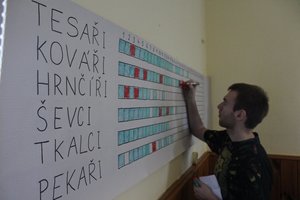The Prague Seminar in Mathematics
If this is the first time you have come across our seminar, then these lines are intended for you. Here you get to know who we are, why and how you can take part in the seminar, what you can get out of it and all sorts of other relevant information.
What is the PIGlet? Who is it here for?
In Czech, we call it PraSe - The Prague Seminar in Mathematics, which translates into English as The PIGlet - The Prague International seminar for young Geniuses. (If you come up with a better interpretetion for the abbreviation, please share it with us in the chat section!) Of course you are not supposed to be a genius if you want to take part in the seminar; but you can expect your friends to think of you as of a genius soon and start calling you "a Math God(dess)". The seminar is intended for high school students (grades 10-13, or else pupils in the last four years before their final exams). (Sadly, if you are a university student, you are not allowed to participate in the competition; however, I still believe you could find joy in trying to solve the problems that are assigned.) The PIGlet is organised by students of the Faculty of Mathematics and Physics at Charles University (abbreviated as MFF CUNI) in Prague. Traditionally, it used to be open only to students who understood the Czech language; only recently we have opened it also to English speaking students, so you have the unique opportunity to be one of our first trully international participants! (Slovaks always took part in the competition, but you can question whether they should be counted as 'international', taking into account that all Czechs and Slovaks older than 17 years were born in the former common state of Czechoslovakia.) Among other purposes, the seminar serves as a good preparation for the Mathematical Olympics and other mathematical competitions. Now, the 29th year of the seminar is running.
How does the seminar run?
The seminar is devided into two parts. Each consists of four series, the topics of which as well as the dates due are known ahead. In addition there is a special ninth series which I write about later. The problems are assigned in Czech and English. If you solve any of the problems, send the solution to us (you can write the solutions in Czech, Slovak or English), we will correct it and send it back together with the results. Do not be afraid to send solution to even a single problem or just a modest attempt at a solution, the others might not do a lot better. Sometimes tenacious participants who solved only one or two problems in each serious have won a place at the final camp! (That obviously depends also on how many points get the others, but you can see that it is worth trying!) In each of the first seven series, there are eight problems, three easier ones and five more difficult ones, evaluated by more points. We attempt to number the problems in the order of increasing difficulty, so if you find a two-line solution of the last problem, you have probably made a mistake somewhere, the solution probably is not right (of course one can never know, we also sometimes make mistakes); but you can see the problems differently difficult than we do, so do not be afraid to attempt the problems with higher numbers. From each series only your best five problems determine the final placings; thus, you can choose the problems that fit you and that you like, or so we hope. The eighth series contains seven problems, one on each topic of a previous series; all your points from this series count. The final placings take into account all nine series, so it is worth sending something from each one of them. You can join the seminar at any time during the school year, that is between September and May.
Why to take part?
By attempting these problems, you deepen your mathematical knowledge. You will be tackling problems that are both interesting (or at least we strive for it) and educational. We try to choose the problems so that everybody gets their due: in the seminar, you come across both very easy problems and those that none of the participants manages to solve fully. If you have not come across competitions of this kind before, do not be discouraged by problems that will seem unsuitably difficult (for example in comparison to problems assigned in the Math Olympics or entrance exams for most universities). For solving the seminar problems you have enough time (usually a couple of weeks), you can use literature, search for similar problems and relevant theory. You are allowed to consult your teacher, parents, friends and whoever will be willing to give you advice. (Please do not take this as an advice to copy word-to-word the answers of your friends who are also participating in the seminar.) Thus even those who think well but slowly can be successful in the seminar. Solving the seminar problems is a lot closer to scientific or any other long-term work than competition in which time is a criteria. In our experience the former participants of the seminar do better than average in their studies at universities - at least those who went on to study at MFF CUNI.
What is the camp?
Each year, we invite between twenty and thirty best participants to two week-lasting camps. The expenses are paid by the Faculty of Mathematics and Physics, so the camps are almost free for the participants - of course, for they are the reward for the best. At the camp you can learn something new about mathematics. You can even personally meet the experts from the Faculty of Mathematics and Physics who will give interesting lectures together with the students of the Faculty. Moreover, the camp is not all about mathematics, but also sports, walking trips, competitions and games of all kinds, debates on serious and amusing topics and lots of fun. Simply, it is a week full of joy, dominated by mathematics. You would be surprised how well it goes together, mathematicians are also just people. We are ready to welcome the international participants to our camps. A personal interpreter (into English) to help you to get around will be available if you are invited and decide to join us. Also, you could stay a bit longer after the end of the camp and enjoy a visit to Prague; we find free accommodation for you and give you some guidance around the city. At the camp, the winners of the previous part of the seminary are given some prizes: usually books on both mathematical and non-mathematical topics or CDs. You can look at the photographs from the past camps at our web pages.
The special series
Since the seventeenth year of the seminar we have also had another specialty: the serial. The participants get a step by step introduction into one part of mathematics and at the end of each part of the text there are three exercises. They usually are a little easier than other seminar problems and rather test your understanding of the text. The serial is counted into the final results as a special ninth series. This year's topics are Inequalities.
What do we need to know about you?
For smooth running of the competition we need some information about our participants. Please, send the following: your name and surname, address (so that we can return your corrected solutions back to you), name of your school and school grade/year, the specialisation of your class or school (00=general, 01=mathematics, 02=physics) and the school year when you will take your final exams. We need these data for determining the final placings, because we discriminate in favour of younger participants, those who do not study in mathematics specialised programmes and those who have only r ecently joined our seminar. Of course all the data about the participants is confidential and we do not reveal it to anyone.
A couple of technical comments
There is a date due for each series (the date on the postmark is critical). If you send your solutions later, we can deduct some points, depending on the length of the delay. (Besides that, it does not make our lives any easier!) You can also send your solutions by e-mail; we prefer the ps format and solutions written in TeX; send the solutions or any questions you want to ask to our email address mks (at) mff.cuni.cz. Do not forget to tell us your postal address; your corrected solutions should arrive no longer than a month or two later, together with the new series of problems. We send the authorial solutions always for two series together, often very soon after the date due of the later. Write solution of each problem on a separate sheet of paper of the size A4 (reason for that is that each problem is corrected by a different person). On each sheet, write your name and surname, the number of the series and markedly the number of the problem (at the best draw a circle around it). If you ca not fit the solution of a problem onto one sheet of paper, number the sheets. Do not use red colour - it is reserved for those who correct the solutions. These wishes are no red tape or bureaucratic procedure; by following them, you help us a lot.
Our address:
Korespondencni seminar KAM MFF UK
Malostranske nam. 25
118 00 Praha 1
CZECH REPUBLIC
Our e-mail address: mks (at) mff.cuni.cz
In the name of all other organisers, we want to say good-bye to you now. We are looking forward to see you among the participants.
Jiri "Dino" Koula, Martin Tancer and Ansa Lauschmannova


